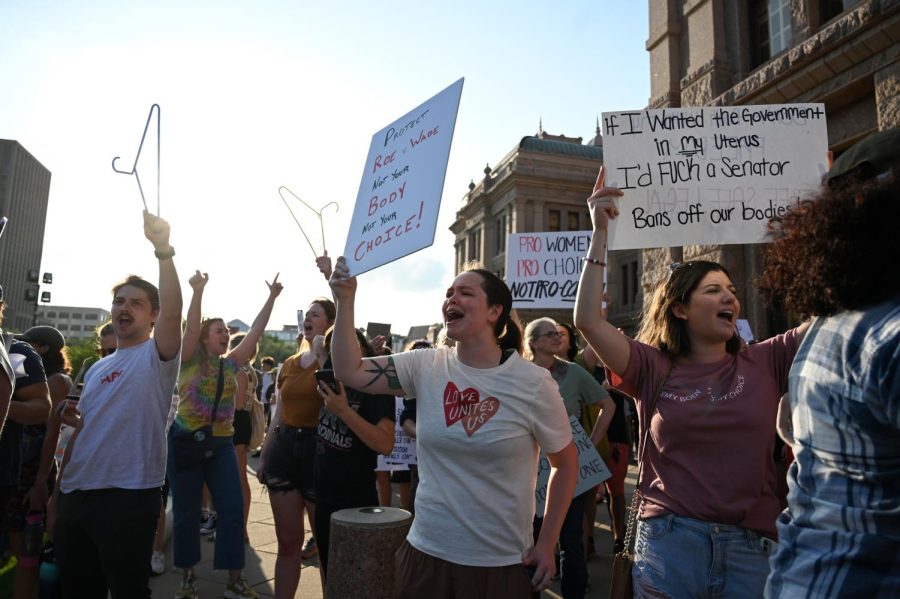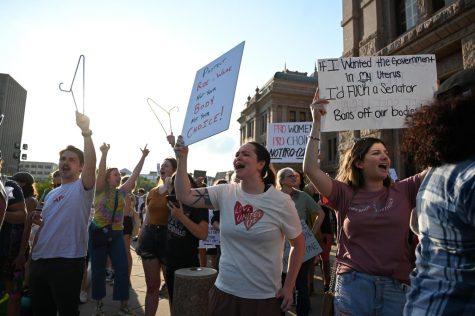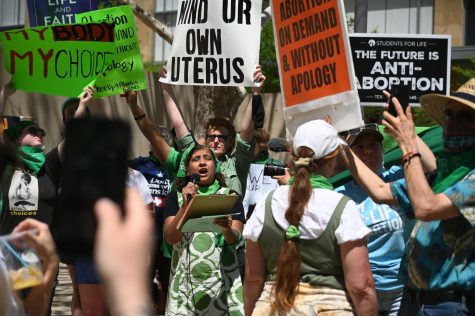Austin City Council member proposes to decriminalize abortion if Roe v. Wade is overturned
After marching from Republic Square, protestors arrive at the Capitol steps on May 3, 2022. The crowd echoed chants such as “my body, my choice.”
June 9, 2022
If the U.S. Supreme Court overturns Roe v. Wade, a state trigger law will criminalize almost all abortions in Texas 30 days after the decision — but Austin City Council member Chito Vela proposed an act to protect Austin abortion seekers and providers from criminalization.
Vela first announced the GRACE Act, which stands for Guarding the Right to Abortion Care for Everyone, to POLITICO in late May. Vela’s proposal comes after POLITICO leaked a draft of Supreme Court Justice Samuel Alito’s opinion that would strike down Roe v. Wade. The GRACE Act restricts city funds from investigating abortions and directs the police department to “treat abortion as lowest priority for criminal enforcement,” according to an email from Jenna Hanes, Vela’s communications director.
The act is co-sponsored by Mayor Steve Adler and city council members Vanessa Fuentes, Paige Ellis and Kathie Tovo. The act will not be brought to City Council unless Roe v. Wade is overturned. Ellis said city governments are at the frontlines of protecting people’s right to access abortions.
“We have to make sure that (with) what tools we have as a city, we’re able to (make) sure that people aren’t unfairly victimized for just simply accessing health care choices,” Ellis said.
Under the state trigger law, all abortions, with an exception for those needed if the pregnant person’s life is at risk, will be classified as a first-degree felony and are punishable by up to life in prison.
“It’s not the government’s role to decide when and how people access abortion,” Ellis said. “There’s a lot of people who have been enacting these laws that will never be pregnant.”
Kathleen Broussard, a former fellow at UT’s Population Research Center who studies the intersection of reproduction, sexual health, medicine and social policy, said she is in support of the GRACE Act because it could encourage other major cities to pass similar acts. However, Broussard said even with the potential act, abortion seekers in Texas may still fear punishment.
“Even if they decriminalize (abortion), it doesn’t necessarily de-stigmatize it,” Broussard said. “(If) the whole state of Texas says that it is illegal, people can still be afraid for their safety — even if they don’t think they’re going to be criminalized — knowing that it’s against the state law.”
Last year, the Texas legislature banned abortions after six weeks of conception, which sparked numerous protests attended largely by student activists. Broussard said if Roe v. Wade is overturned, she expects Texans to receive abortion care the same way they are currently — through medication or by leaving the state.
“The only problem is that (if) Roe is actually overturned, there are many states around Texas that also will likely ban abortion, and those are some of the states that Texans have been traveling to,” Broussard said. “My guess is that people will have to go even further.”
Broussard said she recommends Plan C Pills, an abortion information campaign, for anyone seeking an abortion or information on the procedure.
Social work sophomore Avery White, who is vice chair of the social justice organization Coalition Austin, said the GRACE Act is a good first step in protecting abortion seekers, but it doesn’t change state law.
“I think it really shows how separated legislation and policymakers are from the people and from lower level lawmakers,” White said. “It’s also quite a bit worrying.”









